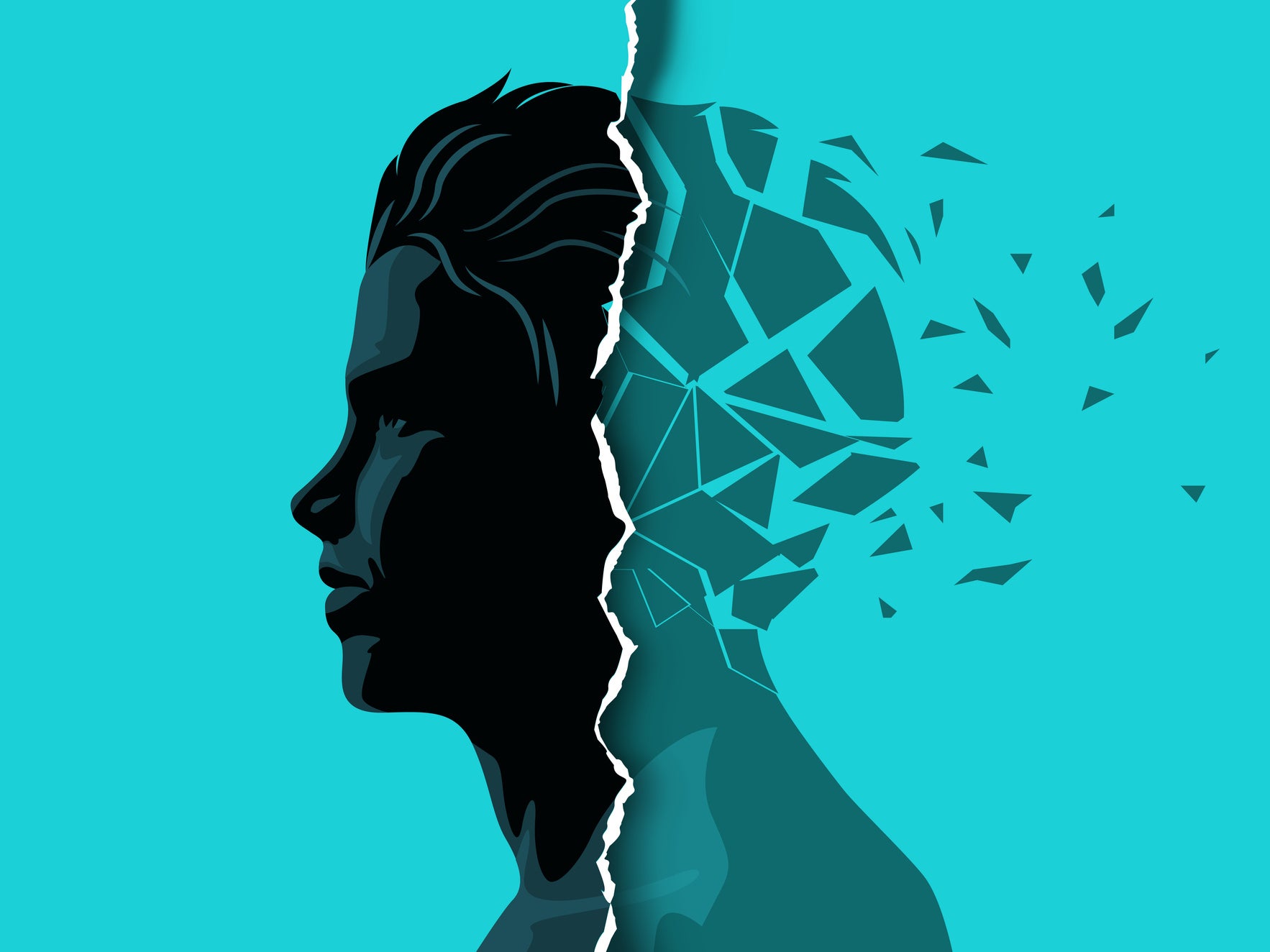World Mental Health Day: How lockdown has impacted mental health
Sabrina Barr hears how lack of face-to-face contact with friends, family and mental health professionals has been fuelling anxiety in these uncertain times


When Nicola Cooper, 34, from Nantwich, Cheshire, found out she would have to stay confined to her household during lockdown, the thought immediately caused her anxiety to spike. In addition to being immunocompromised due to having Crohn’s disease and diabetes, she has bipolar disorder, borderline personality disorder, OCD and PTSD, having struggled with her mental health since she was a teenager.
“When I found out I’d have to stay at home for a long time, my anxiety skyrocketed because it was such a new thing and no one knew what was happening or how long it would last,” Cooper tells The Independent. “It was out of my control, and the routines I worked so hard at were thrown into disarray.”
Ever since lockdown was established across the UK on Monday 23 March, people’s everyday routines have changed drastically. While Boris Johnson announced a gradual easing of certain restrictions in England on Sunday 10 May, the lockdown and social distancing measures remain in place, and they’re having an enormous impact on people’s mental health.
According to a recent study of 2,000 adults conducted by wellbeing brand Healthspan, the average adult’s anxiety and stress levels has increased by almost 50 per cent in recent weeks. Research published by global children’s charity Plan International UK found that around 40 per cent of girls in the UK feel their mental health has worsened since lockdown was established, while a survey carried out by the Mental Health Foundation concluded that almost a quarter of adults in the UK feel lonely amid the lockdown.
Dr Nicola Scott, clinical psychologist and CEO of Brain Brolly, explains to The Independent that worries concerning the coronavirus pandemic may trigger people’s “fight or flight” response. However, because “we can’t physically fight or physically run from it”, the reaction leaves us feeling anxious without the usual coping mechanisms available to us.
Cooper is currently isolating with her partner and seven-year-old son. Before lockdown, she would regularly see a counsellor at Motherwell Cheshire to support her mental health, an organisation for which she also volunteers. Recently, her counselling sessions have had to take place over the phone, something that she prefers as she feels she can “be more open from the confines of my safe haven of home”.
However, not everyone feels the same way about not being able to participate in counselling sessions in person. Darren Birch, an ex-police officer in his mid-thirties, medically retired from the police force when he was 33 years old after being diagnosed with PTSD.
Birch tells The Independent that he feels well-supported by his psychiatrist, family and clinical team. However, he has struggled with lack of face-to-face contact with people during lockdown, from his psychiatrist and also through his more recent work as a barbershop owner. Two weeks ago, the father-of-two had a session with his psychiatrist over the phone.
Having a telephone conversation with my psychiatrist felt impersonal
“That was quite difficult talking to her over the telephone about how I’ve worsened. Because I’m not doing what saved my life,” he says, emphasising how much his work at his barbershop The Den in Warwick and as an ambassador for the Lion Barber Collective has benefited his mental health. “For me, barbering allows me to be me. I get a sense of community. I talk to my clients, they know about my history and they open up to me. So having a telephone conversation with my psychiatrist felt impersonal.”
Hilda Burke, psychotherapist, couples counsellor and author of The Phone Addiction Workbook, explains that people who may use activities such as going to the gym or socialising with friends to take a “break” from issues in their life may be feeling “trapped” during lockdown. Therefore, if people’s usual “distractions” are “no longer accessible” to them, they may be finding lockdown particularly tough.
Lewis Alexander Baxter, a 21-year-old law student from Blackburn, Lancashire, felt “very disillusioned” when lockdown began, he tells The Independent. This was due to several factors, including the sudden inability to socialise and also the fact that he and his father were taking care of his mother, who has incurable cancer.
In late 2015 and early 2016, Baxter suffered from depression, which he says “controlled every part” of his life. In March 2016, the student attempted to take his own life after the depression “got too much” for him. Since then, he has become a mental health advocate, encouraging people “to speak before they get to that crisis point”.
On 26 March, Baxter had the idea to create a phone line called chit-chat. “We are not an advice line or a help line,” he explains. “There are fantastic mental health charities out there who do that. What we are there for is a chat. If you want a conversation about anything.” In just under two months, the organisation has gained more than 25 volunteers across the country, has conducted 250 calls and acquired funding from the National Lottery.
I didn’t know what to do because I’ve never dealt with anxiety before
Baxter admits that without chit-chat, he would likely “have struggled with my mental health in this time”. “With my Mum’s health, with not being able to see people. Not being able to connect with the outside world,” he says. “That’s been really tough, so this has kept me grounded and filled what is a big void in my life at the moment.”
For women who are pregnant or experience pregnancy loss during lockdown, lack of contact with friends, family and support workers can take a particularly significant emotional toll. In March, maternity care charity Birthrights reported a 464 per cent increase in enquiries to its advice line in comparison to the same month the previous year.
Women's health technology brand Elvie is currently fundraising for pregnancy support charity Tommy’s to ensure its support service can remain open. In a recent survey of 1,000 British mothers conducted by the company, more than half said their mental health was worsening in lockdown. However, 67 per cent said they are not seeking professional help.
Rachel, a social media worker from Rille, North Wales who lives in London, is currently 17 weeks pregnant. During the early stages of her pregnancy, she experienced a subchorionic hematoma, a blood clot in the womb that can cause bleeding. She tells The Independent that this experience was extremely “anxiety-inducing”, especially as it occurred close to the prime minister’s announcement in March that pregnant women were to be deemed “moderate risk” during the pandemic.
Having never experienced any mental health issues before, developing high levels of anxiety made Rachel feel too scared to attend routine appointments at hospital. After emailing Tommy’s Midwives, the charity reassured her that it was safe for her to attend her hospital appointments. Rachel recalls that she had been worried she would “be a burden on the NHS” if she reached out to someone for help. “I didn’t know what to do because I’ve never had to deal with that before,” she says.
There is absolutely no-one who is untouched by the changes we are all having to make
Sophie, who has been a midwife for nine years and has worked for Tommy’s for five years, explains that the charity’s midwife email service has seen a 71 per cent increase in activity since the beginning of lockdown. Of the mental health concerns, the most common are with regards to women who are going through or have experienced a miscarriage, women being unable to be joined by their birth partners in hospital and people feeling anxious about not being able to see loved ones when they bring their newborn home.
“What we’re trying to encourage women to do when they are feeling like they’re struggling is to speak out, to not be afraid to do so and to not feel like they’re taking up people’s time, because they’re really important,” Sophie says. “The whole population of the UK, whatever their medical concern is, needs to know that the NHS is open for them.”
While lockdown measures have started to become more relaxed, with businesses such as garden centres being reopened in England for economic and mental wellbeing purposes, the state of uncertainty surrounding the Covid-19 pandemic continues to fuel anxiety and worry. Dr Jane McNeill, a chartered psychologist at Clinical Partners who specialises in anxiety disorders and trauma, explains that for many people, “mental health problems have become much more pronounced during this period because much of what is happening to us is entirely outside of our control”.
“There is absolutely no-one who is untouched by the changes we are all having to make, but there are going to be some people for whom lockdown is going to be extremely difficult,” Dr McNeill tells The Independent. “But, building some certainty into our day can help us feel a bit more in control of the situation. Developing a sense of routine can be hugely helpful, and connecting with others as much as possible can provide a source of comfort.”
If you have been affected by this article, you can contact the following organisations for support: mind.org.uk, nhs.uk/livewell/mentalhealth, mentalhealth.org.uk, samaritans.org.
Join our commenting forum
Join thought-provoking conversations, follow other Independent readers and see their replies
Comments
Bookmark popover
Removed from bookmarks